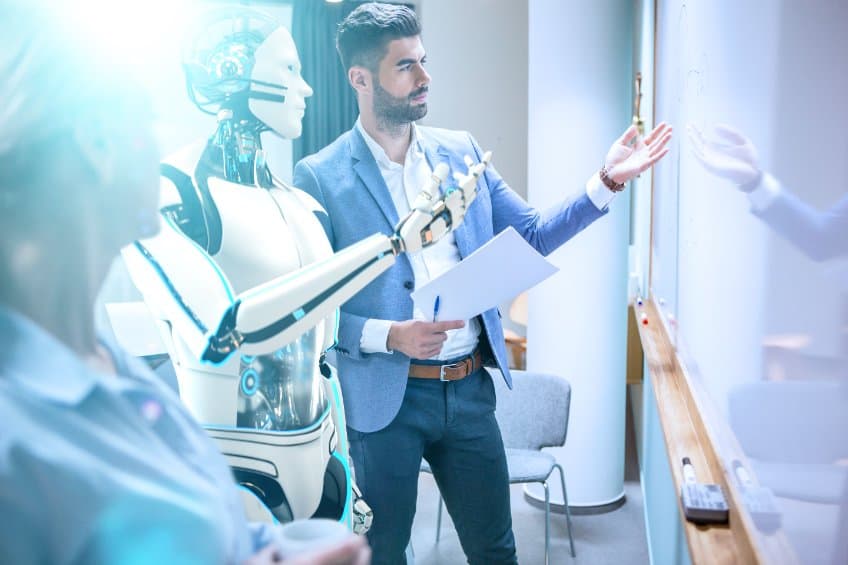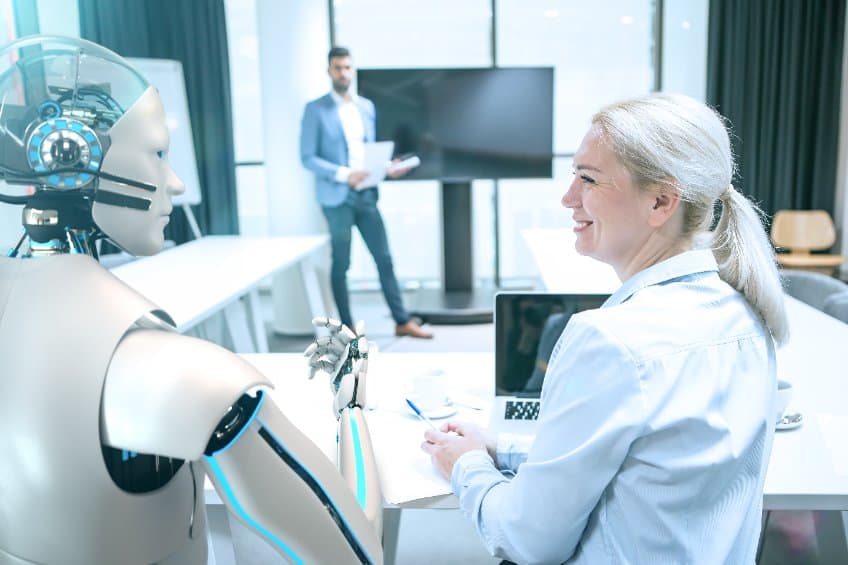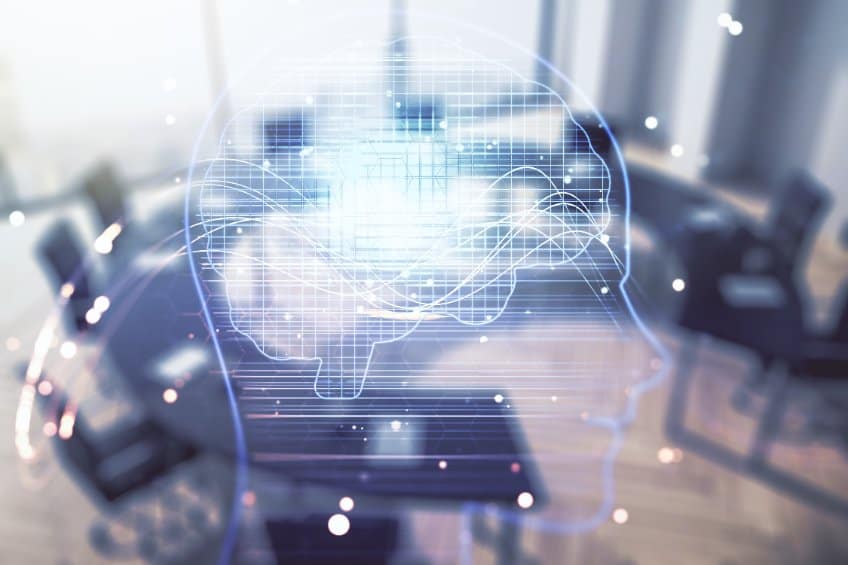Using Artificial Intelligence to Enhance Coaching – A new study

Artificial intelligence is gaining ground and offering new possibilities for coaching. Whilst many coaches are not using AI yet its use is gaining traction and it may be wise for coaches to understand how they can use it.
Coaching
Coaching can be an effective practice that many organisations include in employee professional development programmes to increase their self-efficacy and capability.
Traditional Coaching
Traditional coaching is a face-to-face, usually dyadic (two person) interaction designed to facilitate the exchange of knowledge between coaches with specific areas of expertise and less experienced employees who need to improve their skills.
Be impressively well-informed

Get your FREE organizational and people development research briefings, infographics, video research briefings, a free copy of The Oxford Review and more…
Be impressively well-informed and up-to-date
Innovative Coaching
As organisations integrate more technology into their systems, coaching continues to evolve to incorporate some of this technology. Computer scientists are designing innovative coaching programmes that include artificial intelligence, or AI.

Artificial Intelligence (AI)
The basis of AI is the development of non-human cognitive (mental) functions that operate at a similar level of complexity as humans to guide outcomes like:
- learning
- problem-solving
- social interaction
- creativity
AI based or enhanced coaching has a lot of potential . Artificial intelligence can simulate thinking, learning and intelligent behaviour and machine learning, which is a sub component of AI that allows machines to learn from data to improve performance over time without the interference of humans or further programming.
Artificial Intelligence Coaching
New forms of artificial intelligence and traditional coaching techniques are starting to spawn a new form of coaching: AI coaching. This is a machine and programme-assisted process that helps to coach employees. Whilst human coaches have limited availability due to the limited time they can offer, artificial intelligence coaching is accessible to coachees 24/7 and, with mobile devices, virtually anywhere.
Artificial intelligence, however, has not evolved enough to mimic the capabilities of science fiction fantasies, like for example robots in the Star Trek series. The capabilities for higher levels of nuanced human interaction and thinking are currently still limited. Consequently, we need to be able objectively to evaluate the efficacy of the inclusion of artificial intelligence for coaching programmes.

Artificial Intelligence Evaluation Criteria
A 2017 study found that there are 8 evaluation criteria that can be used to determine if incorporating artificial intelligence into a coaching process would be beneficial.
- The creation and/or use of large data sets – the coaching programme must be able to generate large sets of data because machine learning occurs using huge data sets.
- Clearly defined information flowing throughout the programme – information coming into and out of the programme must be clear and consistently well-defined. For example, employees’ goal descriptions need to contain similar specific data types for the artificial intelligence coach to be able to apply it effectively.
-
Short logic chains – coaching processes based on simple concepts are ideal, since higher and more abstract reasoning capability of artificial intelligence is still limited.
- Ability to tolerate errors – the AI system needs to be able to tolerate errors and deal with erroneous data from the coachees.
- Understandable feedback with clear goals – professional development goals need to be defined clearly, so the artificial intelligence coach can analyse both its own performance and that of the coachee, so that development can be measured.
- Easy access for users with disabilities – coaching usually relies on communication, so artificial intelligence coaches need to mirror these information sharing behaviours without requiring large amounts of physical activity or complexity so as to provide equal access for employees with disabilities.
- Keep explanations simple – decisions that coaches make can be complex at times and can need explaining to the coachee. AI coaches often tend to struggle to explain their decisions, so output still needs to be kept simple.
- Programme functions should remain stable – the initial data sets that AI coaching processes create for training purposes (AI and ML need training) need to be similar to future data sets so the function of the programme remains the same over time.
All in all, these 8 criteria give leaders a starting point for evaluating the potential usefulness of enhancing their organisation’s coaching programme with an artificial coach.
Previous Research
Previous research looking at general coaching and artificial intelligence trends have found that:
- Uses for artificial intelligence have almost unlimited possibilities to improve the quality of human life. These possibilities include applications in education, business, consultancy and healthcare.
- Artificial intelligence is predicted to produce 13 trillion dollars of value worldwide in various industries by 2030.
- Professional development AI based coaching can foster employee well-being and improvements in job performance.
- It is projected that artificial intelligence coaches are destined to become advanced enough to replace human coaches completely in the next decade or so.
It is also thought, however, that artificial intelligence coaches will only be used to assist human coaches to enhance their work in the foreseeable future

A New Study
A new study by researchers from Victoria International University of Applied Sciences and SRH Berlin University of Applied Sciences in Germany has looked at the potential applications for artificial intelligence in coaching.
Findings
The study found that:
- Overall the entire coaching process is adaptable and open to including artificial intelligence capabilities.
- Artificial intelligence coaching is not yet evolved enough to completely replace face-to-face coaching or less complex forms of online coaching.
- Artificial coaching is likely to be more successful in situations where human coaches have identified and diagnosed the problems that coachees need help with (better defined issues). At this point coachees are likely to be handed onto an AI coach to deal with specific issues that are more formulaic and well defined.
- A wide range of human coaches are needed contribute their expertise and knowledge to make artificial intelligence coaching programmes more effective supplemental tools. Computer scientists with no coaching experience are unlikely to be able to produce the data and evaluate the outcomes sufficiently.
Based on these findings, researchers propose that:
- Coaches and human resources departments should take advantage of artificial intelligence coaching, especially since coachees can access support at any time.
- Human coaching should be supplemented with artificial coaching to give coachees the combined benefits of both processes.
- Since coachees can establish positive working alliances with artificial coaches in similar ways to interactions with human coaches, they should not pass up the opportunity to engage with AI based coaches.
- Programme developers need to ensure that user data is secure to make coachees feel more comfortable about sharing private information.
Reference
The effects of human-robotic integration on the humans
Be impressively well informed

Get the very latest research intelligence briefings, video research briefings, infographics and more sent direct to you as they are published
Be the most impressively well-informed and up-to-date person around...
